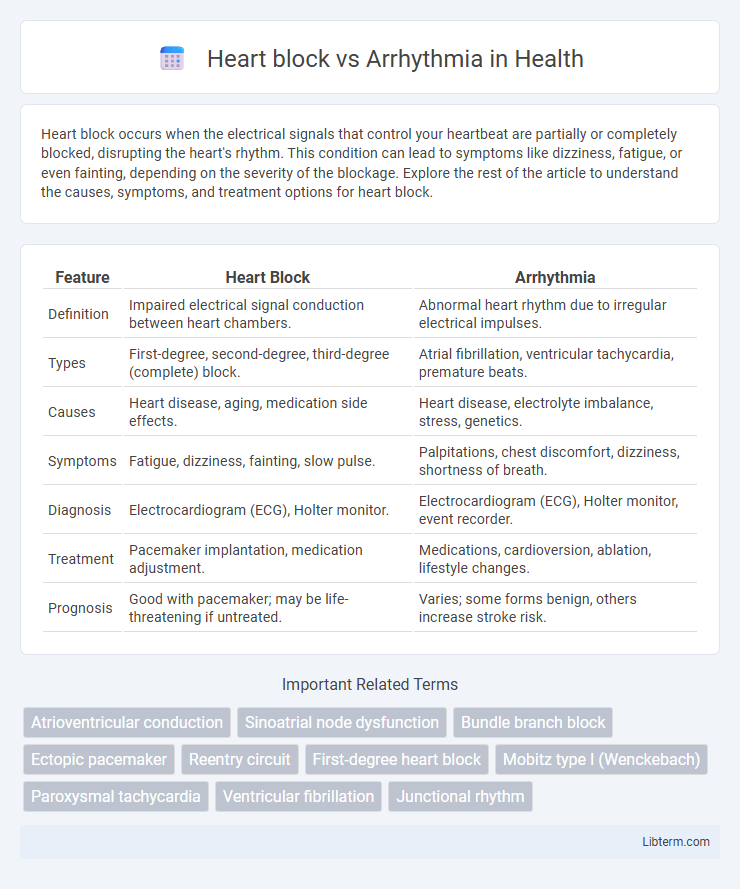Heart block occurs when the electrical signals that control your heartbeat are partially or completely blocked, disrupting the heart's rhythm. This condition can lead to symptoms like dizziness, fatigue, or even fainting, depending on the severity of the blockage. Explore the rest of the article to understand the causes, symptoms, and treatment options for heart block.
Table of Comparison
| Feature | Heart Block | Arrhythmia |
|---|---|---|
| Definition | Impaired electrical signal conduction between heart chambers. | Abnormal heart rhythm due to irregular electrical impulses. |
| Types | First-degree, second-degree, third-degree (complete) block. | Atrial fibrillation, ventricular tachycardia, premature beats. |
| Causes | Heart disease, aging, medication side effects. | Heart disease, electrolyte imbalance, stress, genetics. |
| Symptoms | Fatigue, dizziness, fainting, slow pulse. | Palpitations, chest discomfort, dizziness, shortness of breath. |
| Diagnosis | Electrocardiogram (ECG), Holter monitor. | Electrocardiogram (ECG), Holter monitor, event recorder. |
| Treatment | Pacemaker implantation, medication adjustment. | Medications, cardioversion, ablation, lifestyle changes. |
| Prognosis | Good with pacemaker; may be life-threatening if untreated. | Varies; some forms benign, others increase stroke risk. |
Understanding Heart Block: Definition and Types
Heart block is a cardiac conduction disorder where the electrical signals between the heart's chambers are partially or completely interrupted, leading to abnormal heart rhythms. The main types include first-degree, second-degree (Mobitz type I and II), and third-degree (complete) heart block, each varying in severity and treatment requirements. Understanding these distinctions is crucial for diagnosing and managing conditions that could lead to symptoms like dizziness, fatigue, or syncope.
What is Arrhythmia? Key Features and Forms
Arrhythmia refers to an abnormal heart rhythm caused by irregular electrical impulses in the heart, leading to pulse rates that may be too fast, too slow, or erratic. Key features include palpitations, dizziness, shortness of breath, and sometimes fainting, with ECG abnormalities as critical diagnostic markers. Common forms encompass atrial fibrillation, ventricular tachycardia, bradycardia, and premature contractions, each varying in severity and treatment approach.
Causes: Heart Block vs Arrhythmia
Heart block occurs when the electrical signals between the heart's chambers are delayed or blocked, often caused by damage to the heart's conduction system due to aging, coronary artery disease, or after a heart attack. Arrhythmias result from abnormal electrical impulses that cause irregular heartbeats, frequently triggered by electrolyte imbalances, heart tissue damage, or conditions such as atrial fibrillation and ventricular tachycardia. Both conditions stem from disruptions in the heart's electrical activity but differ in the nature and origin of their conduction abnormalities.
Common Symptoms: Heart Block Compared to Arrhythmia
Heart block commonly presents with symptoms such as fatigue, dizziness, and fainting due to impaired electrical signal transmission between the atria and ventricles. Arrhythmia symptoms often include palpitations, irregular heartbeat, shortness of breath, and chest discomfort caused by abnormal heart rhythms. Both conditions can cause lightheadedness and syncope, but heart block primarily affects the heart's conduction system, whereas arrhythmia involves abnormal rhythm generation or propagation.
Diagnostic Techniques for Heart Block and Arrhythmia
Electrocardiography (ECG) is the primary diagnostic technique for detecting heart block, revealing delayed or blocked electrical impulses within the atrioventricular conduction system. For arrhythmia diagnosis, Holter monitoring and event recorders provide continuous cardiac rhythm tracking, capturing irregular heartbeats not evident in standard ECGs. Electrophysiological studies further localize conduction abnormalities in complex cases of heart block and arrhythmias, guiding targeted therapeutic interventions.
Risk Factors: Who is at Higher Risk?
Heart block risk factors include aging, coronary artery disease, heart surgery, and conditions such as myocarditis or electrolyte imbalances, with older adults and those with pre-existing heart conditions being more vulnerable. Arrhythmia risk is elevated in individuals with hypertension, heart failure, obesity, diabetes, smoking habits, and excessive alcohol or caffeine consumption, alongside genetic predispositions. Both conditions require careful monitoring in patients with a history of cardiac events or structural heart disease to prevent complications.
Treatment Options for Heart Block
Treatment options for heart block vary depending on the severity and type of block, ranging from monitoring mild cases to implanting a pacemaker for advanced or complete heart block. Temporary pacing may be used in emergency situations, while medications like atropine can sometimes improve conduction in certain types of heart block. In contrast, arrhythmia treatments often include antiarrhythmic drugs, catheter ablation, or lifestyle changes, highlighting the distinct therapeutic approaches between these cardiac conduction abnormalities.
Arrhythmia Management and Therapies
Arrhythmia management involves a range of therapies including antiarrhythmic medications, catheter ablation, and implantable devices such as pacemakers and defibrillators to restore normal heart rhythm and prevent complications. Lifestyle modifications, such as reducing caffeine and alcohol intake, alongside monitoring through Holter monitors or event recorders, support effective arrhythmia control. Advanced treatments like catheter ablation target abnormal electrical pathways, providing long-term relief for conditions such as atrial fibrillation and ventricular tachycardia.
Prognosis and Complications: Heart Block vs Arrhythmia
Heart block prognosis varies with severity, where first-degree blocks often remain stable, but third-degree blocks can lead to severe complications like syncope or sudden cardiac arrest if untreated. Arrhythmia prognosis depends on the type and frequency; benign arrhythmias may require minimal intervention, while atrial fibrillation elevates risks for stroke, heart failure, and mortality. Both conditions can cause significant morbidity, but heart block more frequently necessitates pacemaker implantation, whereas arrhythmias often require medication or ablation to prevent thromboembolic events and cardiac dysfunction.
Prevention and Lifestyle Tips for Healthy Heart Rhythm
Maintaining a heart-healthy lifestyle reduces the risk of heart block and arrhythmia by controlling blood pressure, managing diabetes, and avoiding excessive alcohol and caffeine intake. Regular cardiovascular exercise, stress management techniques such as meditation, and adhering to prescribed medications support stable heart rhythm and prevent conduction abnormalities. Routine medical check-ups with ECG monitoring enable early detection and intervention to maintain optimal cardiac electrical function.
Heart block Infographic

 libterm.com
libterm.com